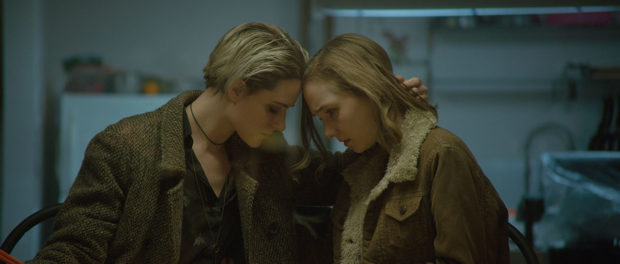Two Takes on Allure: Not a Love Story
The newly released film Allure is a difficult film to describe. Is it simply a story about predatory behaviour, emotional manipulation, and child abuse? Or at its heart is it more about obsession, sexual attraction, and the search for love and connection (no matter how misguided)? There are many themes and subtextual aspects to Allure. It’s definitely not an easy movie to describe or categorize. Actress Evan Rachel Wood delivers a nuanced and multi layered performance in the film. Her character, Laura, isn’t an easy person to like, understand, or even sympathize with; indeed it’s a credit to Wood’s talent that instead of delivering a one-dimensional performance depicting Laura as a villain, Wood digs deeper and channels the troubled young woman’s vulnerability, deep-seated pain, and inner torment.
Allure, which was originally titled A Worthwhile Companion, was written and directed by brothers Carlos Sanchez and Jason Sanchez. A great deal of it was filmed on location in Montreal. The plot involves Laura, a disturbed house cleaner who works for her father’s company. Julia Sarah Stone portrays Eva, a teenager coping with the demands of school, piano lessons, her demanding mother, and the unwelcome prospect of moving in with her mother’s latest boyfriend. Little by little, Laura ingratiates herself into the teen’s life; smoking joints and drinking with her, praising her piano playing and taste in music, etc. Seizing on the opportunity to take advantage of Eva’s unhappy home life, Laura provides the young woman with the option of running away and staying with her. Freedom, or at least freedom from her overbearing mother, however, comes at a price that Eva isn’t mature enough to understand. Interestingly, Wood’s leading role was originally written for a man. This fact raises the questions as to if this gender role reversal might’ve changed or influenced the way viewers perceived or judged the lead character.
At a time when stories about missing children have dominated local headlines Allure might hit too close to home for some audiences. But in Eva’s case she is really more of a runaway than a kidnapped child. Also, at 16 she may legally be a child but throughout the bulk of the narrative she acts of her own accord. This isn’t a justification by any means but it does provide evidence that at least in terms of many of the events depicted in Allure, the situation isn’t as cut and dry as some viewers might’ve been more comfortable with. It’s easier to see relationships and complex situations in strictly black and white terms rather than acknowledge the moral and ethical murkiness of real life.

Allure
Eva’s journey is unique and emotionally and psychologically complex. What begins as a fun time with a much older friend morphs into something a great deal more sinister. The fact remains, however, that throughout the film the teen has ample opportunity to flee from her emotionally manipulative captor and yet makes a conscious decision to stay. Her allegiance to Laura may be chalked up to Stockholm syndrome, brainwashing, a misplaced need to please, or a sense of loyalty. It might even be due to a child’s naïve belief that she will be able to fix a very adult problem.
In various interviews promoting this film, Wood has been quoted as saying that she perceives Laura to be a monster. I disagree. Laura might do monstrous things but again and again viewers are confronted with hints as to the inner chaos and seething pain boiling up within her. She is a wounded soul who has suffered due to the monstrous actions of someone who should’ve been her protector and greatest ally. In an attempt to ease her pain and not feel so alone, Laura has adopted destructive coping mechanisms. She drinks excessively, smokes, engages in sex with dangerous men, and gets emotionally (and often physically) involved with individuals who should be off limits.






